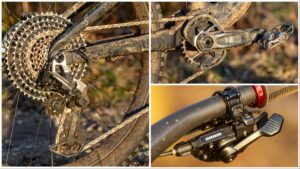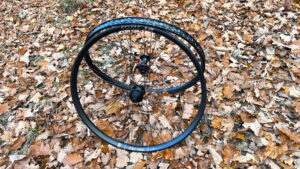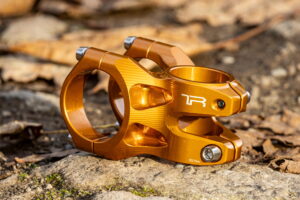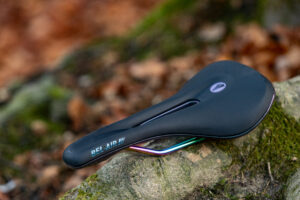Manitou Mezzer has burly 37mm stanchions and up to 180mm travel. It weighs just over 2kg, so also makes sense for aggressive trail bikes
Manitou Mezzer Pro suspension fork review
Manitou Mezzer has burly 37mm stanchions and up to 180mm travel. It weighs just over 2kg, so also makes sense for aggressive trail bikes.
Read more: Best mountain bike forks – get the best suspension fork for your bike<
The distinctive beefy chassis uses a reverse arch that sits lower down for (in theory) greater stiffness. External adjustments including (interdependent) high and low speed compression dials, and low speed rebound. There are actually both high and low speed rebound circuits, but the former is factory set. The compression damping design means that low speed adjustment will have minimal effect until the high-speed compression adjuster is also dialled in from fully open.

Speed compression dials work in unison
The Dorado air spring is also different from competitors and comprises of three separate (relatively low volume) chambers. The self-equalizing positive and negative is unusually located at the foot of the lower leg, while something Manitou calls IRT (infinite Rate Tune) inflates at the top of the crown. These three interact in a way that might sound complicated, but Manitou’s set-up guide is thorough, and, basically, the independent IRT manipulates the mid-stroke for more support or progression – a bit like a traditional volume spacer, albeit with more tuneability.
On top of all that, there’s also a factory-set hydraulic bottom out control to smooth out and absorb the harshest impacts at the end of travel via an independent damping circuit.

We ended up putting slightly higher air pressure than recommended in the main spring, and set the high-speed damping either wide open or with one click, which suggests damping might be a bit too aggressive for lighter or slower riders.
Composed over repeated hits, one of the Mezzer’s best assets is its supportiveness, or the ability to smoothly stay within a ride height ‘window’ – so you never get pitched or jolted around, even through really rough chunder. Off-the-top grip and sensitivity is good (that’s useful for tracking small wet roots or slime leant over), but isn’t quite as silky as the best here in terms of the initial touch around sag on the smallest, vibrational, hits.

The Dorado spring is pretty sensitive to small pressure changes, but if you’re prepared to precisely dial in the balance by bracketing, there’s tons of support to keep the front end propped up on steep sections, without harshness or the excessive ramp-up sometimes felt with a firmer air spring. The Manitou Mezzer can also handle huge landings and drops extremely calmly; all making it great for a heavy hitter looking for a stable fork that isn’t too harsh or staccato on medium sized hits.
One thing we noticed was that, while the chassis is impressively light, even with fatter stanchions there’s a sense it just doesn’t feel as tight and solid as rivals when smashing through repeated braking bumps or eroded furrows. What’s not in doubt, however, is how the sub £900 price represents good value considering the level of tunability and overall performance.
















